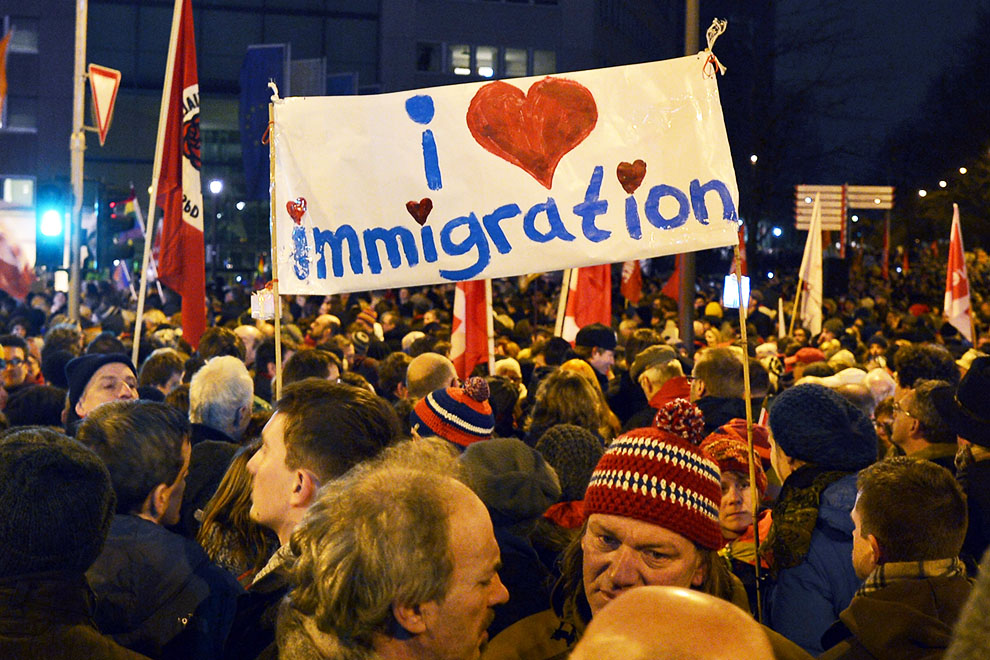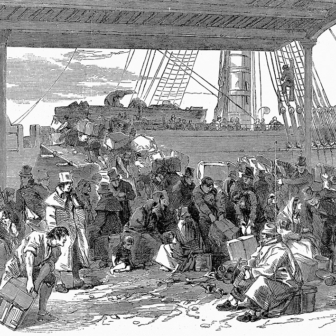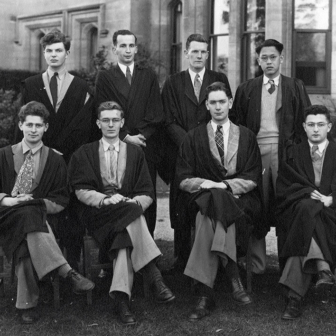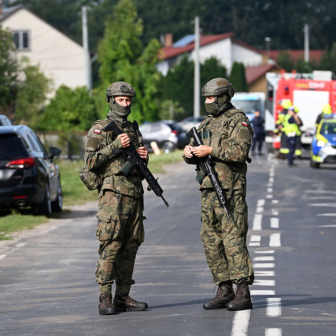Germany has been in the grip of Pegida fever. This relatively new movement claims to represent the views of an – allegedly sizeable – section of society that feels uneasy about Germany’s embrace of multiculturalism. It worries about the large numbers of asylum seekers in Germany, and about the presence of Islamists, and appears genuinely afraid that Germans will be marginalised in their own country. Pegida has organised rallies at which speakers have railed against migrants in general and asylum seekers and Muslims in particular.
Pegida’s full name is the Patriotische Europäer gegen die Islamisierung des Abendlandes (Patriotic Europeans Against the Islamisation of the West). Its founder claims that the culturally loaded term Abendland in the organisation’s name, which means “the West” or, literally, “the Occident,” merely echoes a slogan used by the Christian Democrats during an election campaign more than fifty years ago: “Rettet die abendländische Kultur!” (Save Western culture!). At that time, of course, the Abendland was supposedly under threat from Soviet communism. But this rather quaint term harks back further, to a time when a Christian Abendland felt under threat from a Muslim Morgenland (Orient). It also references Oswald Spengler’s hugely influential book Der Untergang des Abendlandes (The Decline of the West), published between 1918 and 1922, an early precursor of Samuel Huntington’s 1996 book The Clash of Civilisations.
The political establishment’s response to Pegida has been remarkably loud, clear and swift. Federal president Joachim Gauck called Pegida’s followers Chaoten – a term usually reserved for football hooligans and violent demonstrators on the far left – and used his traditional Christmas address to affirm Germany’s commitment to welcoming migrants of all kinds. For once, chancellor Angela Merkel has not been her usual noncommittal self: on New Year’s Eve she was uncharacteristically forthright in her televised address to the nation, urging Germans not to join demonstrations organised by Pegida. A couple of weeks later, at a joint press conference with Turkish prime minister Ahmet Davutoğlu, the chancellor endorsed a controversial statement first made by interior minister and prominent Christian Democrat Wolfgang Schäuble in 2006 and paraphrased by Gauck’s predecessor as president, the Christian Democrat Christian Wulff, four years later: “Der Islam gehört zu Deutschland” (Islam is part of Germany).
Foreign affairs minister Walter Steinmeier has accused Pegida of damaging Germany’s reputation. Former chancellors Helmut Schmidt and Gerhard Schröder lambasted the xenophobia of the Pegida movement, with the latter calling for “an uprising of the decent.” Church leaders, representatives of migrant groups and many other civil society organisations, and prominent artists, actors, writers and sportspeople have criticised Pegida for inciting racism and defended German’s multicultural identity. Numerous anti-Pegida rallies have been held: last Friday, for example, some 20,000 people took to the streets of Freiburg, a city of just over 200,000 people in Baden-Württemberg in the southwest of Germany, to protest against Pegida.
Pegida’s creation is fairly recent: in October last year, forty-one-year-old Dresden resident Lutz Bachmann, who had not previously been politically active, set up a closed Facebook group under the name Peaceful Europeans Against the Islamisation of the West. The ostensible trigger was a rally by supporters of the Kurdistan Workers’ Party, or PKK, which is considered a terrorist organisation in many Western countries, including Australia and Germany, but has gained many admirers in recent months because of its much-needed military support in the fight against the Islamic State in Syria.
Pegida was incorporated as an association in December, with Bachmann as its chairperson. Only twelve people have so far been identified as actively involved in the organisation – the same group that was part of Bachmann’s Facebook group in October, it appears. It is not known how many additional members Pegida has signed up since December.
Considering the barrage of fire the organisation has drawn, non-Germans could be forgiven for assuming it is the nucleus of a powerful new party on the far right, a kind of German equivalent of the Front National, which won almost a quarter of the French votes at last year’s European election. Or that Pegida is a particularly violent movement, whose followers torch mosques and hostels for asylum seekers. Far from it: Pegida does have a reasonably strong following in Dresden, the capital city of Saxony and the second-largest city (not counting Berlin) in former East Germany, but outside Saxony it has attracted little support. And its leaders have not condoned violence, nor – publicly, at least – peddled extremist views. In fact, what’s remarkable is not so much Pegida’s strength or the depth of racism expounded by its leaders, as the backlash it has attracted.
Pegida’s official positions are comparatively innocuous, and hardly explain the outrage and fear the movement has prompted. According to a catalogue of demands published in December, it wants existing laws to be used to deport unsuccessful asylum seekers, demands an immigration regime modelled on the policies of Australia and Canada, calls for Swiss-style plebiscites, would like the German constitution to be amended to refer to the right and duty of non-native Germans to integrate, asks for additional resources for the police, and calls for more social workers to care for asylum seekers.
Pegida’s leaders have tried to distance themselves from the far right. “We are normal people,” Bachmann told the Financial Times in a rare interview, claiming that less than 1 per cent of Pegida’s followers were “right-wing madmen”. The association’s public Facebook page makes extensive use of a symbol associated with the campaigns of left-wing anti-fascists: the image of a swastika in a rubbish bin. But there is no doubt that some of Pegida’s leaders have spouted Islamophobic and racist rhetoric in the past, that its followers have done so on numerous occasions over the past couple of months, and that at least some of its leaders have toyed with, if not wholeheartedly embraced, ideas from the far right. One of the key terms used by Pegida’s followers has been Lügenpresse (lying media), a term, popular with the Nazis, that a panel of academics recently selected as the Unwort (non-word) of 2014.
At other times, Pegida’s leaders have advocated positions that have at best been confused. They say, for example, that they have been vindicated both by the recent siege in Sydney and by the Charlie Hebdo murders in France, and have claimed that Germany’s leaders were unfairly criticising Russian president Vladimir Putin’s policy in Ukraine. And while the Pegida leadership has been anxious to avoid the impression that the organisation sits on the far right, they have not been able to avoid endorsements from leading neo-Nazis or a growing racist, Islamophobic and xenophobic following.
The Pegida leadership has tried to disown those endorsements. Last week, it went further and tried to disown its founder. In December it was reported that Bachmann had a string of convictions including robbery, assault and drug trafficking. Another of Pegida’s twelve-strong steering group, Kathrin Oertel, became the association’s public face, with Bachmann remaining as chair. But last week he was forced to surrender Pegida’s leadership when a newspaper revealed he had used the derogatory term Viehzeug (animals) to refer to refugees, had suggested prominent Green politician Claudia Roth be shot, and had posed as Adolf Hitler and posted the picture on Facebook with the caption, “He’s back.”
Since then, Pegida’s leadership group has been further eroded. On Wednesday, Oertel and four other members of the twelve-strong steering group resigned in protest at moves by Bachmann to retain a decision-making role. “I don’t want to have anything to do with all this Nazi stuff and right-wing statements,” former Pegida vice-chair René Jahn told the tabloid Bild. Yesterday, Jahn and Oertel announced that they would try to set up a new organisation designed to appeal to a more moderate audience. In the meantime, next Monday’s weekly demonstration in Dresden has been cancelled.
So far, Pegida’s public activities have been largely confined to organising weekly rallies. The first took place in Dresden on 20 October last year. A mere 350 people attended. Five weeks later, on 24 November, the number of protesters in Dresden reached 5500. The biggest Pegida demonstration so far took place on 12 January, when, according to the police, 25,000 people joined the weekly march through Dresden’s city centre. The weekly attendance figures have been anxiously anticipated, and closely scrutinised, with the police estimates proving controversial. On 12 January, for instance, a team of researchers from the Wissenschaftszentrum Berlin counted only 18,400 protesters.
Pegida’s rallies began at a time when Germans were publicly remembering the so-called Montagsdemonstrationen, the Monday evening rallies in East German cities in autumn 1989 that eventually led to the collapse of the communist regime. Pegida says that its protests resurrect the Montagsdemonstrationen tradition and, like the demonstrators of twenty-five years ago, its followers claim that “Wir sind das Volk” (We are the people). Their appropriation of the East German civil rights movement has been condemned and ridiculed. It is curious also because the 1989 protests did not originate in Dresden; in fact, Dresden was arguably one of the strongholds of the East German government at a time when it was already on the nose almost everywhere else.
One of the explanations for the fact that Dresden residents joined the 1989 protests comparatively late is that they were living in the Tal der Ahnungslosen, the “valley of the clueless,” one of two comparatively small areas of East Germany where it was not possible to receive West German television. In fact, the acronym of the leading West German public broadcaster ARD (Arbeitsgemeinschaft der Rundfunkanstalten Deutschlands) was sometimes rendered as Ausser Raum Dresden (anywhere but in the Dresden region).
Today, nobody in Germany could claim to be ignorant about what has been going on in Dresden since October. The ARD and other television channels have reported extensively on the Pegida rallies, whose organisers clearly hoped that, inspired by the televised images, Germans in other parts of the Federal Republic would follow their example.
Yet nearly all attempts to mobilise anti-migrant sentiments in other German cities have failed. On 5 January, a mere 300 people responded to a call by Pegida associate Kögida (Cologne Against the Islamisation of the West). A week later, 200 demonstrators identifying themselves as followers of Hagida (Hanover Against the Islamisation of the West) took to the streets of Lower Saxony’s capital city (which is about the same size as Dresden). Only in Leipzig, the largest city in Saxony, have attempts to imitate the Dresden example been moderately successful. There, police estimated a 15,000-strong crowd of Legida demonstrators last Wednesday. (Researchers from the University of Leipzig counted no more than 4850 attendees.)
Counter-demonstrations have dwarfed these efforts. On 12 January, 200 Hagida followers in Hanover were met by 17,000 anti-Hagida protesters. The 300 people who had responded to a call by Saargida in Saarbrücken were confronted by 9000 protesters. In Frankfurt last Monday, seventy Pegida sympathisers were outnumbered by some 12,000 anti-Pegida protesters. Even in Saxony, Pegida and Legida demonstrations have been smaller than those organised by their opponents. On 10 January in Dresden, 35,000 people rallied for “open-mindedness and tolerance”; another 22,000 attended an anti-Pegida event earlier this week. In Leipzig, 30,000 anti-Legida demonstrators assembled on 12 January, and another 20,000 last Wednesday. Some anti-Pegida protests have been highly symbolic: on the evening of 5 January, local authorities in Berlin, Cologne, Dresden and other German cities turned off the lights illuminating iconic landmarks, including the Brandenburg Gate and the Cologne cathedral.
Some of those opposed to Pegida are acting out of self-interest. In Dresden, local politicians and business leaders fear that the organisation will scare off tourists. The chair of the Federation of German Industries, Ulrich Grillo, condemned Pegida’s anti-immigration message because, in his words, “Germany really benefits from skilled immigration.” In early January the head of the German Employers’ Association, Ingo Kramer, told the news magazine Focus, “We need immigration for our labour market and so that our social system can also function amid a shrinking population of employable age in the future.” Others are concerned about Germans’ or Germany’s reputation.
Ulrich Grillo’s statement didn’t end there, however. “As a wealthy country,” he added, “and simply out of Christian love of thy neighbour we should welcome more refugees.” And most of those attending the demonstrations in Freiburg and elsewhere are not primarily voicing their opposition to the rabble demonstrating on a weekly basis in Dresden or taking issue with their irrational fear of the introduction of sharia law in Germany. They are taking to the streets to affirm their commitment to a multicultural Germany that welcomes strangers, particularly those seeking refuge from war and persecution. They are rallying for, rather than against, an idea of what it means to be German.
Pegida’s followers, conversely, while claiming to defend “German” values against Muslims and other foreigners supposedly swamping the country, are making a statement about fellow citizens who take issue with the government’s refugee and asylum seeker policies only because these aren’t sufficiently generous. They feel threatened and are enraged by those who want Germany to be a country of immigration, who would like Turkish Germans to be able to take out German citizenship while retaining their Turkish passports, and who cherish the multicultural flair of most large German cities.
Unlike the Front National’s Marine Le Pen, Pegida’s Kathrin Oertel and Lutz Bachmann can’t pretend they are speaking in the name of a silent majority who would like Germany to be reserved for ethnic Germans. Pegida’s followers are also motivated to protest because they – correctly – identify as a marginalised minority. Not one member of federal parliament has spoken up in their defence. The mainstream media have had nothing good to say about them; even Bild, which is otherwise quick to lend its voice to right-wing populist causes, has not only distanced itself from Pegida but also actively campaigned against its ideas. Admittedly, Pegida’s Facebook page has attracted more than 160,000 likes. But let’s put that into perspective: that’s less than a quarter of the number of people who have watched a hilarious YouTube clip poking fun at “Pegida girl” Oertel.
In the 1980s and 1990s, it was not uncommon to see young German men, usually sporting crew cuts or shaved heads, wearing t-shirts with the slogan “Ich bin stolz ein Deutscher zu sein” (I am proud to be German). Then it was safe to assume that these men sympathised with the far right. Many Germans who abhorred such sentiments expressed shame at being German.
At that time, people like Lutz Bachmann could claim to own German patriotism. They no longer can, and that would be another reason why they are deeply aggrieved. Unlike the Pegida and Legida demonstrators, those rallying last week against Pegida in Freiburg did not carry German flags. But their protest was also patriotic. They are proud of a new Germany: one that welcomes refugees and promotes open-mindedness and solidarity. The identity of this new Germany is partly negative (which probably makes German identity unique): on Wednesday, speaking at a special session of the German parliament to mark the seventieth anniversary of the liberation of Auschwitz, Joachim Gauck said that “there can be no German identity without Auschwitz.” But unlike twenty or thirty years ago, there is more to a non-nationalistic German identity than a recognition of what Auschwitz stands for. And Germans who acknowledge the past and oppose a parochial nationalism are no longer ashamed to be Germans.
I bet many of those attending the anti-Pegida demonstrations no longer have a problem with the emblems of German nationalism per se. There might be occasions when they too wave German flags. And most likely, such occasions involve football. More than anyone else, Germany’s national football team has made national symbols respectable. But the Germany that the footballers represent includes people of different ethnic backgrounds – in the same way that the team of Jogi Loew includes Turkish Germans, Polish Germans, Germans of North African ancestry and Germans who hail from Bavaria or Hamburg. Lutz Bachmann would find it increasingly difficult to identify with that team; the vast majority of Germans don’t. Bachmann might also feel aggrieved because Oliver Bierhoff, manager of the national team and an exceptionally successful player in the 1990s, was prominent among those to publicly denounce Pegida. “We have become world champions with many players who have a migrant background,” Bierhoff said earlier this month. “We in the national team live integration without thinking twice about it; that should also work in society.”
Posing as Adolf Hitler is socially unacceptable. But I suspect many Germans would have been more affronted when it emerged that Bachmann had not only used derogatory language to refer to refugees and politicians, but had also called Jogi Loew Bundesschwuchtel (national poofter). The inability to embrace Loew and the national football team irrespective of their success on and off the field is an indication of the extent to which Bachmann and his followers feel they are on the outer. In fact, the German win in Brazil – and the sense that Germany is now well represented by people like Thomas Müller and Mesut Özil – would have contributed to the anger and resentment on display at the Pegida demonstrations. As I suggested in an earlier essay in Inside Story, the significance of Germany’s success in Brazil can hardly be overstated: it, more so than the arrival of thousands of refugees from Syria, has been responsible for the polarisation of which Pegida is merely the most visible symptom.
In 1989, Dresden was exceptional on account of its isolation: because its residents weren’t able to watch the ARD news. Now, Dresden is back in a valley of the clueless. Its residents have far less first-hand experience of non-German migrants and of multiculturalism than the people of West German cities of a similar size, such as Frankfurt, Stuttgart or Hanover. At the end of last year, less than 5 per cent of Dresden’s residents were non-Germans, compared to Hanover’s 13 per cent, Stuttgart’s 21 per cent and Frankfurt’s 24 per cent.
That in itself does not explain the emergence of anxieties and deep-seated anger that drive tens of thousands of people to take to the street. Both Dresden and Leipzig are exceptional because they are located in Saxony. That is one of three states, all of them in East Germany, where the far-right National Democratic Party has received more than just a handful of votes in recent elections (in Saxony, it won 4.9 per cent in the 2014 state election and thus only narrowly missed the 5 per cent threshold necessary to enter parliament). Saxony is also one of only three states (again, all of them in the former East Germany) where the Eurosceptic Alternative for Germany scored enough votes to be represented in state parliament.
Most importantly, however, Saxony’s government of Christian Democrats and Social Democrats is the only one in Germany that has shown some empathy for those afraid of foreigners. In November, state premier Stanislaw Tillich, a Christian Democrat, announced that the police would form a special unit to investigate crimes committed by asylum seekers, even though there was no evidence that suggested asylum seekers have been more prone to fall foul of the law than other residents of Saxony. Earlier this month, Saxony’s interior minister arranged a secret meeting with Pegida leaders. And Tillich has contradicted Merkel’s recent statement about Islam’s role in Germany; he was adamant that Islam does not belong to Saxony.
Unlike their counterparts in neighbouring Austria and France, Germany’s mainstream politicians seem to have agreed over the past fifteen years or so that right-wing populists cannot be effectively countered by appropriating some of their positions. As a result, Germany’s far right is weak. Meanwhile, the political spectrum has moved to the left. Merkel promotes positions that traditionally belonged to the Social Democrats, and – exceptions such as Tillich aside – she has taken her party with her. The only state ruled by a genuinely conservative party in its own right (the sister party of the Christian Democrats, the Christian Social Union, or CSU) is Bavaria, but there too the government has usually been careful not to take up an agenda promoted by the far right. Last year, the CSU demanded that non-native Germans be required to speak German at home, but quickly backtracked and claimed it had been misunderstood.
In Austria and France, by contrast, conservative politicians have tried to stem the rise of right-wing populist parties – Marine Le Pen’s Front National and Heinz-Christian Strache’s Freedom Party of Austria (which once campaigned with the slogan “Abendland in Christenhand!,” The West belongs to Christians!) – by appropriating some of their key positions, particularly on immigration. That hasn’t stopped the rise of the populists. To the contrary: Le Pen has a realistic chance of becoming France’s next president, and Strache’s party sits currently on around 20 per cent. On top of that, xenophobia and anti-immigration sentiments have become respectable in Austria and France. It seems Saxony’s government is falling into the same trap – which, incidentally, should also be familiar to Australians, who may remember that in the late 1990s, John Howard’s Liberal Party tried to stop the rise of the One Nation Party by adopting some of the positions advocated by its leader, Pauline Hanson.
It may well be that Pegida, bereft of much of its former leadership, will implode. But it seems unlikely that that will be the end of the story. Other political groups – whether it’s the far right National Democratic Party or the Alternative for Germany – might try to harvest Pegida’s 160,000 Facebook followers. Senior representatives of the latter have already held meetings with some of Pegida’s leaders to identify common ground. Oertel and Jahn may succeed in setting up a new organisation that mobilises supporters in Dresden. Pegida or its successors will be able to draw on comparatively reputable public figures such as prominent former Social Democrat Thilo Sarrazin and the Social Democratic mayor of the Berlin district of Neukölln, Heinz Buschkowsky, who have written books that put forward seemingly reasonable arguments suggesting that “foreigners” are not willing or able to integrate and that Germany is a deeply divided society because it has allowed the emergence of ethnic enclaves. Fears that Germany will move to the right and close its borders to asylum seekers, however, would be unjustified.
Pegida represents people who have every reason to feel marginalised. In today’s Germany, their ideas are increasingly anachronistic. That won’t stop them. And it won’t prevent people from embracing these ideas to justify violence: against Muslims, against asylum seekers or against those seen to be responsible for their marginalisation, including journalists or politicians. Last year, racist violence, including thirty-five incidents of arson in hostels for asylum seekers, has been on the rise. Saxony has seen a good deal of that violence; it recorded the comparatively largest number of racially motivated assaults on refugees.
The demonstrations of the last three months have shown that Pegida and Legida followers are a force to be reckoned with in Dresden and, to a lesser extent, in Leipzig. We might well be seeing an increasing polarisation of Germany. Dresden, a largely monocultural city in the far southeast, and the traditionally conservative state of Saxony, whose government believes that right-wing populism is the best antidote to right-wing populism, stand for one side. Multicultural Freiburg, the first German city ruled by a mayor from the Greens, and the traditionally equally conservative state of Baden-Württemberg, which is governed by a coalition of Greens and Social Democrats in which the latter are the junior partner, stand for the other side.
In 2015, most German cities resemble Freiburg rather than Dresden. Overall, Germans are now more likely to demonstrate their solidarity with refugees than protest against their presence. But that’s a fairly recent development. Only twenty-five years ago, Germans were anxious that they were being swamped by “economic refugees” and Scheinasylanten (bogus asylum seekers). In 1991 and 1992, rioting “ordinary Germans” in the East German towns of Rostock and Hoyerswerda were trying to burn down asylum seeker hostels. So it is perhaps understandable that the response to Pegida has been overheated. Many of those demonstrating in Freiburg would not even be able to remember Hoyerswerda, which is anyway a world away from Baden-Württemberg, but Gauck and Merkel, both of them from East Germany, surely do. It is to be hoped that they are determined to prevent a repeat of that particularly dark chapter in postwar German history. I suspect they know that one way of doing that is by depriving racists of oxygen, not entering into a dialogue with them and not showing them any compassion, even if that strategy runs the risk of making them only more angry. •




